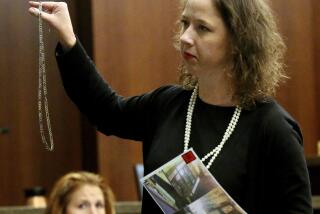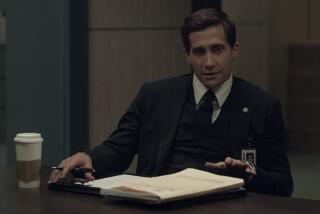Unabomb Prosecutors Emphasize Team Effort
- Share via
SACRAMENTO — They walk together down the street. They enter the courtroom together. When the judge asks a question, the three seasoned federal prosecutors simultaneously crane their necks to put their heads together.
Attorneys prosecuting alleged Unabomber Theodore Kaczynski say their interaction, both publicly and privately, reflects a real collaboration.
“It is very much a team here, a team effort,” said Robert J. Cleary, a thin bearded man who is typically in the middle of the huddle as the lead prosecutor pursuing murder-by-bombing charges against Kaczynski.
Cleary is unquestionably the captain of this team. He was (and remains) the No. 2 prosecutor in the U.S. attorney’s office in New Jersey when Atty. Gen. Janet Reno selected him in April 1996 to lead the government’s case against Kaczynski.
Working countless hours since then with investigators, Cleary and co-counsels Stephen P. Freccero and R. Steven Lapham have assembled a stack of evidence--including Kaczynski’s own diary--to tie the former UC Berkeley mathematics professor to a nationwide string of bombings that lasted 18 years.
Whether Cleary and his California-based colleagues--none of whom has tried a capital case--have the expertise to persuade the jury to call for Kaczynski’s execution, should it find him guilty, remains much more of an open question. Kaczynski has pleaded not guilty, and his trial begins Dec. 29.
*
Colleagues on the East Coast say that if anyone has what it takes to keep the prosecution on track and put Kaczynski on death row, it is the tireless and unflappable Bob Cleary. They salute him as a “prosecutor’s prosecutor.”
Similar words of praise emanate from Cleary’s courtroom opponents: smart, even-keeled, diligent, tough but fair, focused and, perhaps most of all, willing to listen to both sides.
New York criminal defense attorney Ronald Fischetti cited a 1989 case that reflected the respect in which opponents hold Cleary.
Fischetti said he once squared off against him in a tax fraud case and initially underestimated the then-unknown prosecutor. Fischetti said Cleary beat him, and he gained a large measure of admiration for his courtroom foe.
Fischetti described Cleary as “one guy who is perfect for putting together a case that has so many pieces, the Unabomber case.”
“This is a man who can study a case meticulously and put it together like a jigsaw puzzle and make it intelligible to a jury,” he said.
Kaczynski’s brother, however, sounded one of the few sour notes about Cleary. David Kaczynski, a New York social worker whose tip led authorities to his brother, complained recently that the prosecutor had let him down, perhaps misled him.
“When Mr. Cleary promised me [that] a fair and impartial evaluation of my brother’s mental state would be made before a decision on the death penalty, I believed him,” David Kaczynski said in an interview. Instead, he said, the decision to pursue the death penalty was made before a government psychologist talked to his family.
Cleary declined to discuss David Kaczynski’s criticism. But the prosecutor’s friends strike a far different chord in describing the 42-year-old New York native as someone with an inbred sense of right and wrong.
Cleary suggested that his zest for investigating a case and putting the pieces of a crime together may have come from growing up the son of a New York City policeman.
“I like being on the side that’s trying to do right,” said Cleary, whose father is now an attorney.
A graduate of the College of William and Mary in Virginia, Cleary received his law degree from Fordham Law School in 1980. Afterward, he was in private practice and assisted in civil litigation arising from the 1981 collapse of sky-walks at a hotel in Kansas City, Mo.
In 1984, Cleary, who one former supervisor suggested was always interested in becoming a prosecutor, joined the Justice Department in Washington as an attorney specializing in criminal tax cases.
After a three-year stint in Washington, he moved to the U.S. attorney’s office for the southern district of New York, the department’s flagship office. A rising star, he handled an array of tax and white-collar criminal cases.
A serious jogger, Cleary sometimes would run to his New York office from home. He is also an avid hiker. Cleary said he took a backpack trip through Patagonia on his honeymoon. His wife is on leave as a Justice Department attorney. She is expecting the couple’s first child.
*
In 1994, Cleary left the New York office as chief of the major crimes unit and became second in command of the federal prosecutor’s office in New Jersey. He handled many of the office’s day-to-day administrative duties.
Although the Unabomber case is clearly the most high-profile trial Cleary has overseen, he also supervised a celebrated New Jersey case involving a post office massacre. It led to guilty pleas and a lifetime federal prison sentence for the defendant.
Defense lawyers say Cleary is tough on criminals but does not automatically accept his underlings’ recommendations for prosecution.
Gerald Krovatin, a New Jersey criminal defense attorney, recalled that he was disappointed when he failed to change Cleary’s mind in negotiations. Still, he said, he got a fair hearing.
Said Krovatin: “He has not been . . . a guy who rubber-stamps a decision that has already been made. . . . [You] get the sense he’ll look at something and struggle to see the other side of an issue, and that’s not always true of prosecutors in my experience.”
Just a month after Cleary stepped up to the New Jersey job, he was thrown into the Unabomber case when advertising executive Thomas Mosser was killed in his North Caldwell, N.J., home by a package bomb. Cleary became the New Jersey liaison to the San Francisco-based task force investigating the Unabomber string of bombings.
Nearly two years ago, Faith Hochberg, the U.S. attorney in New Jersey, told the New York Daily News that she and Cleary often talked about Mosser’s death.
“Certain crimes that are so heinous that you can’t get them out of your mind, you can’t rest until they are solved,” she said in April 1996 after Kaczynski’s arrest and Cleary’s selection as lead prosecutor.
Kaczynski has also pleaded not guilty in Mosser’s death. That trial is expected to begin after the trial in Sacramento is completed.
Cleary said he doesn’t know why he was singled out for the top spot at the prosecution table.
But each major U.S. attorney’s office involved in the case proposed its top prosecutor involved in the bombing probe, and they were interviewed by a Justice Department team, recalled one participant.
On the basis of his interview and his status as the top assistant in the New Jersey office, Cleary was selected as the best candidate for the job, the source said.
Howard Shapiro, former FBI general counsel, relayed his high praise of Cleary to the selection panel.
Shapiro recalled that Justice Department officials were looking primarily at prosecutors working on Unabomber matters, and of that group, “I knew Bob was a terrific prosecutor and a wonderful trial lawyer.”
During jury selection, Cleary has shared the chore of questioning potential panelists with Freccero and Lapham.
Freccero, 38, played a major role in drawing up the search warrant that FBI agents carried with them when they descended on Kaczynski’s tiny Montana cabin. He has been involved in the case since 1993.
Freccero majored in religion at Wesleyan University and received his law degree from UC’s Boalt Hall School of Law. In 1989, he joined the U.S. attorney’s office in San Francisco after a year with a law firm in that city. He is married, with two children.
Lapham, 45, has served in the U.S. attorney’s office in Sacramento since 1984. He earned his undergraduate degree at UCLA and graduated in 1979 from Hastings College of Law in San Francisco.
He has directed a variety of cases, including a major investigation of the wine industry. Lapham, whose interests include skiing, cooking and wine, is married and has one daughter.
Besides a handful of FBI agents and analysts, the government team also includes Bernard F. Hubley, 49, an assistant in the U.S. attorney’s office in Helena, Mont., and several other attorneys in Washington.
Cleary emphasized that there was a minimum of conflict among the attorneys and others drawn from around the nation.
“We haven’t had a situation where I’ve had to pull rank,” he said. “I’m a big believer in consensus building.”
Times staff writer Ronald J. Ostrow in Washington and researcher Patti Williams in Sacramento contributed to this story.
More to Read
Sign up for Essential California
The most important California stories and recommendations in your inbox every morning.
You may occasionally receive promotional content from the Los Angeles Times.













